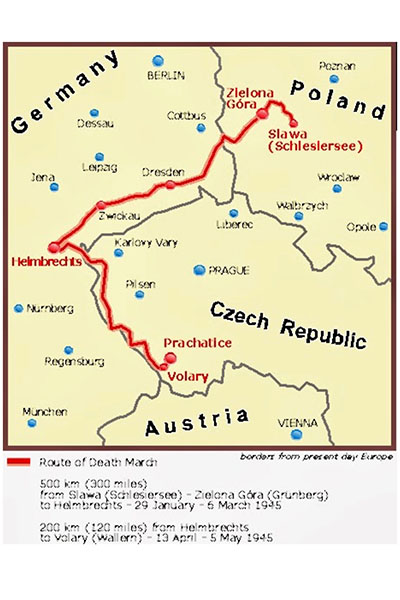 Holocaust Remembrance
Holocaust Remembrance

Herta Munk Zauberman
Herta was born on August 26, 1924 in Dziedzice, Poland. She was born to her parents Julia and Isador Munk. She was an only child. Herta was very close to her maternal grandparents Charlotte and David Zierer. Her father Isador was a business man who owned a small department store and her grandfather David owned a business that exported grass from Belgium and Holland that was used for making mattresses. Herta attended a Polish Public School where she was the only Jewish student in her class. There were only 250 Jewish families in her area. During the winter she would ride a horse-drawn sleigh to school. She had a St. Bernard and German Shepard and her grandfather owned horses. Herta went to synagogue regularly with her grandfather and was involved in the Zionist youth movement.
At the outset of the war, Jews were forbidden to go out during certain hours and to frequent specific stores. Isador’s business was immediately shuddered. Food became scarce and Herta’s family had to figure out how to barter for items they needed. In June 1942, all the Jewish families were rounded up and separated. Herta was separated from her family and sent to a work camp in Germany called Bolkenheim. There, Herta and a group of 50 teenage girls worked long hours (12-15 hrs/day) weaving fabric for military parachutes. After approximately a year, she was transferred to a different work camp called Merzdorf where she endured harsh living and working conditions, was given little food and witnessed regular violence.
Towards the end of the war, Herta was transferred to Grunberg and was part of a “Death March” that lasted 106 days. It was very cold, and the women walked without shoes for miles a day through the snow. They slept outside or in abandoned barns. As the group continued, the women approached a small village close to the Czech border. Herta’s friend suggested that they run away and escape, however Herta was reluctant. She wasn’t a risk taker and was scared. Herta told her friend to go without her. At the last moment, Herta decided to make a run for it. Together they ran off the road towards a cemetery with a small shed beside it. They quickly hid in the shack and prayed that they would not be followed or caught. Some women tried to follow them, but were shot. Herta and her friend waited until dark and then came out and walked towards a tiny light that turned out to be a house. They were taken in and given food and shelter although Herta and her friend didn’t disclose that they were Jewish. As soon as the family discovered that they were Jewish, they were asked to leave. Herta and her friend were directed to cross the border to the Czech Republic where they were ultimately nursed back to health by a family.
Felix Zauberman
Felix was born on June 29, 1917 in Bendzin, Poland. Bendzin was a vibrant town with a large Jewish community. Felix lived in a small apartment with his mother Fela, father Chil younger sister Eva and younger brother Moniek. His father Fela owned a printing shop and often Felix would help out there. At first, Felix attended a yeshiva-type school, but later switched to a public school due to financial concerns. He was very proud of his Jewish faith and was an involved member of a Zionist Youth group. Felix had a bar mitzvah at his local synagogue and observed Shabbat and Jewish holidays with his family.
When the war broke out in 1939, Bendzin was occupied immediately as it was adjacent to the German border. There was a shortage of food, valuable possessions were taken from Jewish families and a curfew of 9pm was instituted. Their nearby synagogue was burned, and many Jewish townspeople were killed. The Germans began deporting Jews every few months to different work and concentration camps. In the middle of 1943, Felix’s mom, dad and brother were taken to Auschwitz-Birkenau. Three weeks later Felix and Eva were taken to Auschwitz-Birkenau via cattle car. He was ultimately separated from Eva and never saw her again. The Germans replaced his name with a number and tattooed it on his arm (135624). Life was very difficult in the Auschwitz-Birkenau as there was little food, hard wooden beds and they weren’t allowed to bathe/shower.
Displaced Persons (DP) camp in Salzburg Austria
Both Herta and Felix arrived at a DP camp in Salzburg, Austria. They were trying to locate lost relatives and ultimately make their way to Israel. Felix worked in the office and was one of the leaders of the DP camp. All the Jewish singles knew each other and spent Shabbat together. The women would cook dinner and invite all the men as well as the American Jewish soldiers. After a courtship of 6 months, Herta and Felix were married on June 18,1946. They welcomed a daughter, Judith Zauberman on April 13, 1950. While they hoped to move to Israel to make Aaliyah, they couldn’t secure visas and instead emigrated to America via ship (the U.S. General C.C. Ballou). They were sponsored by a Jewish Organization and had to first move to St. Paul Minnesota before moving to New York to rejoin some of the friends they had met in the DP camp. These friends became their “Holocaust” family. They celebrated holidays and special occasions together. These friendships remained integral to Herta and Felix throughout their lives.





Herta and Felix Zauberman - 1949

Herta and Felix Zauberman - 1950